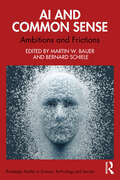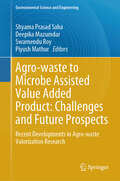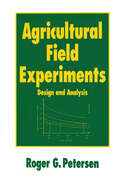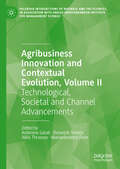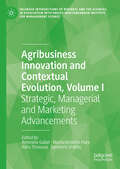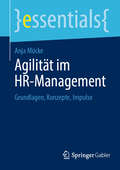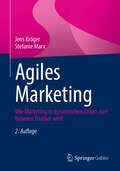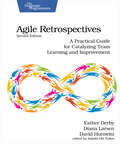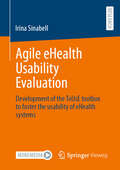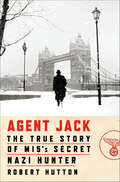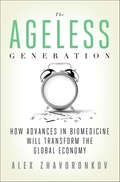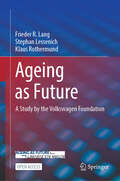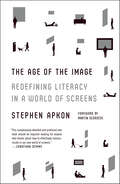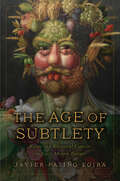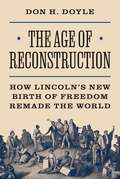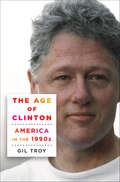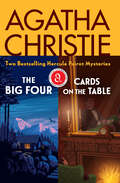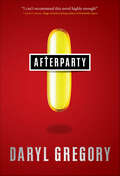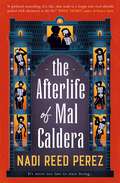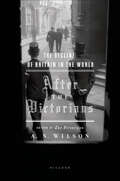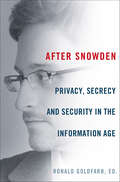- Table View
- List View
AI and Common Sense: Ambitions and Frictions (Routledge Studies in Science, Technology and Society)
by Martin W. Bauer and Bernard SchieleCommon sense is the endless frontier in the development of artificial intelligence, but what exactly is common sense, can we replicate it in algorithmic form, and if we can – should we?Bauer, Schiele and their contributors from a range of disciplines analyse the nature of common sense, and the consequent challenges of incorporating into artificial intelligence models. They look at different ways we might understand common sense and which of these ways are simulated within computer algorithms. These include sensory integration, self-evident truths, rhetorical common places, and mutuality and intentionality of actors within a moral community. How far are these possible features within and of machines? Approaching from a range of perspectives including Sociology, Political Science, Media and Culture, Psychology and Computer Science, the contributors lay out key questions, practical challenges and "common sense" concerns underlying the incorporation of common sense within machine learning algorithms for simulating intelligence, socialising robots, self-driving vehicles, personnel selection, reading, automatic text analysis, and text production.A valuable resource for students and scholars of Science–Technology–Society Studies, Sociologists, Psychologists, Media and Culture Studies, human–computer interaction with an interest in the post-human, and programmers tackling the contextual questions of machine learning.
Agro-waste to Microbe Assisted Value Added Product: Recent Developments in Agro-waste Valorization Research (Environmental Science and Engineering)
by Swarnendu Roy Piyush Mathur Shyama Prasad Saha Deepika MazumdarThis book mainly focuses on the recent trends and sustainability challenges in the valorization of agro-wastes, emphasizing the role of microbial biotechnology. Processing of various kinds of agro-wastes such as lignocellulosic materials, food industry wastes, dairy wastes, etc., into several bioactive compounds, enzymes, biofuels, biogas, biofertilizers, nutraceuticals, nanoparticles, etc., will be discussed elaborately in more detail. This book investigates the theoretical and practical aspects of modern research regarding the valorization of agro-wastes through microbial technology. Moreover, the role of valorization research in circular bio-economy will also be addressed in this book.
Agricultural Field Experiments: Design and Analysis (Books in Soils, Plants, and the Environment #Vol. 31)
by Roger G. PetersenThis text provides statistical and biometrical procedures for designing, conducting, analyzing and interpreting field experiments. It addresses the most important research topics in agriculture, including agronomy, breeding and pasture trials; farming systems research; and intercropping research.
Agribusiness Innovation and Contextual Evolution, Volume II: Technological, Societal and Channel Advancements (Palgrave Intersections of Business and the Sciences, in association with Gnosis Mediterranean Institute for Management Science)
by Demetris Vrontis Alkis Thrassou Antonino Galati Mariantonietta FioreAgriculture is the oldest and most traditional of economic sectors, and its business has seen major leaps in innovation over the past century. Contemporary agribusiness is being influenced and reshaped by technological developments, geopolitical developments, and globalisation, as well as transport and logistics innovations, changes in consumer behaviour.Reflecting on these changes and providing a deep dive into this sector, this two-volume work defines, refines, analyses, and prescribes the evolution of agribusiness in the present and future. Taken together, the books offer a comprehensive conceptualisation of the multifactorial macro, micro and organisational elements of agribusiness, including strategic, managerial, marketing, technological and geo-socio-political forces.Volume II focuses on the wider, macro-environmental forces acting upon agribusinesses, exploring the contextual evolutions that impact the sector, and the means, practices and avenues for its development.It includes topics such as digital technologies adoption, supply chain sustainability, big data analytics, women’s agricultural entrepreneurship, and simulation model decision making.
Agribusiness Innovation and Contextual Evolution, Volume I: Strategic, Managerial and Marketing Advancements (Palgrave Intersections of Business and the Sciences, in association with Gnosis Mediterranean Institute for Management Science)
by Demetris Vrontis Alkis Thrassou Antonino Galati Mariantonietta FioreAgriculture is the oldest and most traditional of economic sectors, and its business has seen major evolutionary leaps over the past century. Contemporary agribusiness is being influenced and reshaped by technological advancements, geopolitical developments, globalisation, transport and logistics innovations, as well as changes in industry structure and consumer behaviour. Reflecting on these changes and providing a deep dive into this sector, this two-volume scientific works’ collection defines, refines, analyses, and prescribes the evolution of agribusiness in the present and future. Taken together, the books offer a comprehensive conceptualisation of the multifactorial macro, micro and organisational elements of agribusiness, including strategic, managerial, marketing, technological and geo-socio-political forces. Volume I explores the strategic, managerial and marketing aspects of contemporary agribusiness, and descriptively and prescriptively investigates the organisational and immediate industry practices and sectoral forces. Topics covered include circular business models, CSR communication practices, digital marketing, organisational sustainability and contemporary farming systems, to name a few..
The Agony of Joy
by Red HaircrowFormer model-turned-actor Adrian Lee can barely list age range 23–29 on his résumé anymore, nor stand his life of empty social events and appearances, meaningless roles, and casual partners. When he meets Alexander Skizetsky by clever arrangement of his agent, the enigmatic yet infinitely attractive Russian kindles a little light of hope in his aching heart. Yet even the beginnings of a friendship and love beyond his wildest dreams cannot stop a life spiraling out of control.The long estrangement from his devout Irish Catholic parents and family and the dark secrets they all share combine to drive Adrian to the brink of despair, though Alexander becomes determined to stay by his side. After locking away his own memories of betrayal and loss, Lexx had decided never to love again, but something in Adrian spurs the noblest intentions in his formerly jaded heart.Returning in pilgrimage to Alexander’s homeland, on a journey of rebirth, revelation, and redemption, can they escape the ghosts of their pasts to find true love together?NOTE: This book contains references to childhood sexual assault that might disturb some readers.
The Agony of Flies: Notes and Notations
by Elias CanettiAgony of Flies: Notes and Notations presents brief aphorisms selected from the German Nobel laureate Elias Canetti's writings.These short writings collected in this bilingual edition offer remarkable insight into the life and thinking of "one of our great imaginers and solitary men of genius" (Iris Murdoch).
Agitar su Jaula: (Una novela de los Baxter Boys ~ Agitado)
by Jane CharlesDoce años ha esperado Dylan White. Doce años desde que su familia fue arrebatada. Doce años de estar solo, excepto por los amigos que conoció en Baxter, quienes ahora son su familia. Su hermano, Noah, ha desaparecido. Su hermana, Nina, acaba de cumplir dieciocho años, pero él no tiene forma de encontrarla. Mary Robins muestra su corazón en la manga. Y está tatuado en su pecho: las placas de identificación del hombre al que adoraba, rodeadas de hermosas cintas. Su único propósito en la vida es cuidar de aquellos que lo necesitan. Curar a los heridos y consolar a los heridos, esa es la razón misma por la que se está convirtiendo en enfermera. Excepto que nunca ha permitido que nadie cuide de ella. No desde hace mucho tiempo. Nadie ha querido cuidar de ella hasta que conoce a Dylan y a los chicos de Baxter. Son un grupo extraño, ferozmente leales y... suyos. Dylan está buscando algo, y también lo está Mary. Buscan familia, amistades y amor. ¿Podrán encontrar lo que necesitan desesperadamente en el otro? ¿Pueden Dylan y Mary encontrar lo que necesitan desesperadamente en el otro?
Agilität im HR-Management: Grundlagen, Konzepte, Impulse (essentials)
by Anja MückeDieses essential gibt einen Überblick zu Agilität im Unternehmenskontext und zeigt deren Relevanz für das HR-Management auf. Es stellt die wichtigsten agilen Prinzipien, Begrifflichkeiten und Methoden vor. Am Beispiel von Rekrutierung, Personalentwicklung und Performance Management skizziert die Autorin, welche konkreten Anforderungen und Ansatzpunkte sich daraus für die Gestaltung von HR-Prozessen und -Instrumenten ableiten und wie die HR-Organisation selbst agiler aufgestellt und gestaltet werden kann. Damit liefert dieses essential Orientierung und Hilfestellung dabei, die aktuelle Agilitätsdebatte für die eigene HR-Arbeit einzuordnen. Der Inhalt Einführung in Agilität: Historie, Prinzipien, Begrifflichkeiten & Methoden Agilität im HR-Management: HR als Transformationsförderer und -begleiter, agile HR-Prozesse und Instrumente, Agilität in der HR-Organisation Die Zielgruppen Praktiker*innen im HR und Management aus Unternehmen Studierende der Betriebswirtschaftslehre/Betriebsökonomie mit Schwerpunkt HR/Personal
Agiles Marketing: Wie Marketing in dynamischen Zeiten zum Business Enabler wird
by Jens Kröger Stefanie MarxDieses Buch vermittelt einen umfassenden Überblick zu relevanten Basics, Methoden und Tools, wie Sie Ihre Marketingorganisation und -teams durch Agilität erfolgreich und effizient aufstellen können. Bei Agilität geht es in erster Linie um ein Mindset, radikal kundenzentrierte Kommunikation, eine bewegliche Aufbauorganisation, um crossfunktionales Arbeiten über Abteilungsgrenzen hinweg sowie um permanente Erfolgsmessung und Anpassung. Bei erfolgreicher Umsetzung kann damit eine wegweisende und starke Rolle der Marketingabteilung im Gesamtunternehmen erreicht werden. Marketing kann so zum Business Enabler werden und in den Bereichen Kundenbeziehung, Innovation und Organisation Wirkung entfalten. Vor allem die letzten Jahre haben mit der Corona-Pandemie, Kriegen und Rezession sowie tiefgreifenden technologischen Fortschritten, gezeigt, dass Anpassungsfähigkeit und ein entsprechendes Mindset kritikale Voraussetzungen für performantes Marketing sind, welches wiederum den Erfolg der Gesamtunternehmung sichern kann. Am Ende des Buches werden Sie wissen, was Agilität im Marketing bedeutet, welche agilen Methoden Sie dabei unterstützen können und wie die Team-Organisation und die Zusammenarbeit mit anderen Fachabteilungen ausgestaltet werden kann. Vor allem zeigen die beiden Autoren auf, wie Sie mit einer dynamikrobusten Marketingabteilung die drei Wirkebenen Kundenbeziehung, Innovation und Organisation erfolgreich gestalten und dadurch Marketing zu einem wesentlichen Erfolgsfaktor des Unternehmens machen. Aus dem Inhalt Wieso agiles Marketing eine geeignete Antwort auf dynamische Zeiten ist Konsequente Entwicklung eines agilen Mindsets in (Marketing-)Teams Werte und Prinzipien des agilen Marketings Methoden und Tools zur operativen Umsetzung agilen Marketings Wie Marketing durch Agilität zum Business Enabler werden kann und Mehrwert für die Gesamtorganisation stiftet Eine pragmatische Starthilfe für Ihren Weg zur agilen Marketingorganisation Verankerung der Fachabteilung Marketing in der Organisation
Agile Retrospectives, Second Edition
by David Horowitz Esther Derby Diana LarsenIn an uncertain and complex world, learning is more important than ever before. In fact, it can be a competitive advantage. Teams and organizations that learn rapidly deliver greater customer value faster and more reliably. Furthermore, those teams are more engaged, more productive, and more satisfied. The most effective way to enable teams to learn is by holding regular retrospectives. Unfortunately, many teams only get shallow results from their retrospectives. This book is filled with practical advice, techniques, and real-life examples that will take retrospectives to the next level--whether your team is co-located, hybrid, or remote. This book will help team leads, scrum masters, and coaches engage their teams to learn, improve, and deliver greater results. For nearly two decades, scrum masters, team leads, and coaches have relied on the first edition of Agile Retrospectivesas an essential resource to facilitate better retrospectives. This edition builds on recent research, reflects the authors' experiences over two decades, and shares wisdom gleaned from the global retrospective community. Find practical advice to level up retrospective skills. Address the challenges of remote and hybrid retrospectives head on. Take advantage of expanded guidance on designing and facilitating retrospectives--based on the questions and concerns of practitioners worldwide. Gain insight into choosing a broad or narrow focus for retrospectives. Explore how to use both objective and subjective data to enable more effective conversations. Learn how to make decisions that stick. Understand the importance of psychological safety and how to foster it in retrospectives. Elevate issues and engage managers in systemic change. Learn from many real-life stories that demonstrate how our advice has impacted retrospectives at organizations around the globe. Finally, find a set of recommended flows that reveal the authors' thought process in designing retrospectives for scenarios teams faced in real life.
Agile eHealth Usability Evaluation: Development of the ToUsE toolbox to foster the usability of eHealth systems
by Irina SinabellThe integration of usability evaluations into iterative software development processes is becoming increasingly relevant, as gathering feedback from prospective users is crucial to improving the usability of eHealth systems. Traditional approaches to eHealth usability evaluation, however, are difficult to reconcile with the iterative software development process, which is why there is an increasing need for agile usability evaluation. Despite the existence of approaches to agile usability evaluation, it is unclear whether they are suitable to rapidly evaluate patient-centered eHealth systems being iteratively developed in health care applicable, for prospective users such as elderly persons suffering from age-related declines. This research includes an innovative and comprehensive toolbox called ToUsE, toolbox for eHealth usability evaluation, which consists of more than 40 rapidly deployable and potentially useful eHealth usability evaluation methods developed by the author. The ToUsEtoolbox is intended for use by software developers, medical informaticians, usability experts, or medical professionals who aim at performing an eHealth usability evaluation. The book provides detailed descriptions of all the eHealth usability evaluation methods included in ToUsE.
Agent Jack: The True Story of MI5's Secret Nazi Hunter
by Robert Hutton"An appealing mix of accessibility and research. [Hutton] has illuminated a fascinating and often appalling side of the war at home." — Wall Street Journal The never-before-told story of Eric Roberts, who infiltrated a network of Nazi sympathizers in Great Britain in order to protect the country from the grips of fascismJune 1940: Europe has fallen to Adolf Hitler’s army, and Britain is his next target. Winston Churchill exhorts the country to resist the Nazis, and the nation seems to rally behind him. But in secret, some British citizens are plotting to hasten an invasion. Agent Jack tells the incredible true story of Eric Roberts, a seemingly inconsequential bank clerk who, in the guise of “Jack King”, helped uncover and neutralize the invisible threat of fascism on British shores. Gifted with an extraordinary ability to make people trust him, Eric Roberts penetrated the Communist Party and the British Union of Fascists before playing his greatest role for MI5: Hitler's man in London. Pretending to be an agent of the Gestapo, Roberts single-handedly built a network of hundreds of British Nazi sympathizers—factory workers, office clerks, shopkeepers —who shared their secrets with him. It was work so secret and so sensitive that it was kept out of the reports MI5 sent to Winston Churchill. In a gripping real-world thriller, Robert Hutton tells the fascinating story of an operation whose existence has only recently come to light with the opening of MI5’s World War II files. Drawing on these newly declassified documents and private family archives, Agent Jack shatters the comforting notion that Britain could never have succumbed to fascism and, consequently, that the world could never have fallen to Hitler. Agent Jack is the story of one man who loved his country so much that he risked everything to stand against a rising tide of hate.
The Ageless Generation: How Advances in Biomedicine Will Transform the Global Economy
by Alex ZhavoronkovOver the past 20 years, the biomedical research community has been delivering hundreds of breakthroughs expected to extend human lifespan beyond thresholds imaginable today. However, much of this research has not yet been adopted into clinical practice, nor has it been widely publicized. Biomedicine will transform our society forever by allowing people to live longer and to continue working and contributing financially to the economy longer, rather than entering into retirement and draining the economy through pensions and senior healthcare. Old age will become a concept of the past, breakthroughs in regenerative medicine will continue, and an unprecedented boom to the global economy, with an influx of older able-bodied workers and consumers, will be a reality. A leading expert in aging research, author Alex Zhavoronkov provides a helicopter view on the progress science has already made, from repairing tissue damage to growing functional organs from a single cell, and illuminates the possibilities that the scientific and medical community will soon make into realities. The Ageless Generation is an engaging work that causes us to rethink our ideas of age and ability in the modern world.
Ageing as Future: A Study by the Volkswagen Foundation
by Stephan Lessenich Frieder R. Lang Klaus RothermundContemporary societies are aging – but what does that mean? Is this something bad? And can societies age as a whole? By bringing together psychological, gerontological, and sociological findings, this open access book opens up a hitherto unique, multifaceted, and realistic view of the phenomenon of old age and the process of aging. The volume is based on the results of the project “Ageing as Future”, a long-term project network (2007-2021) involving a total of more than 30 scientists worldwide. The focus of the project was threefold: A first issue was concerned with how views on aging influence development in old age; secondly, the project analyzed determinants and consequences of provision for old age; and thirdly, it investigated the different ways in which aging is shaped by managing time in old age. For more than a decade, the authors conducted quantitative and qualitative studies, involving large samples from three different continents. The results show that one-sided views of old age – whether negative stereotypes or positive exaggerations – do not do justice to the complexity of the experience of aging. Based on these results, the authors plead for individual and societal acceptance of the social fact of aging – and for the right to live an autonomous and dignified life in old age just as in other phases of life. Ageing as Future: A study by the Volkswagen Foundation presents findings from a unique large international study that are of interest to aging researchers around the world: academically, socio-politically, practically, and personally. Whether old or young, the book encourages one to question one's own views of aging. When reading this book, it becomes obvious that old age is a highly diverse experience, depending on a host of societal and individual factors.
The Age of the Image: Redefining Literacy in a World of Screens
by Stephen ApkonAn urgent, erudite, and practical book that redefines literacy to embrace how we think and communicate nowWe live in a world that is awash in visual storytelling. The recent technological revolutions in video recording, editing, and distribution are more akin to the development of movable type than any other such revolution in the last five hundred years. And yet we are not popularly cognizant of or conversant with visual storytelling's grammar, the coded messages of its style, and the practical components of its production. We are largely, in a word, illiterate. But this is not a gloomy diagnosis of the collapse of civilization; rather, it is a celebration of the progress we've made and an exhortation and a plan to seize the potential we're poised to enjoy. The rules that define effective visual storytelling—much like the rules that define written language—do in fact exist, and Stephen Apkon has long experience in deploying them, teaching them, and witnessing their power in the classroom and beyond. In The Age of the Image, drawing on the history of literacy—from scroll to codex, scribes to printing presses, SMS to social media—on the science of how various forms of storytelling work on the human brain, and on the practical value of literacy in real-world situations, Apkon convincingly argues that now is the time to transform the way we teach, create, and communicate so that we can all step forward together into a rich and stimulating future.
The Age of Subtlety: Nature and Rhetorical Conceits in Early Modern Europe (The Early Modern Exchange)
by Javier Patiño LoiraA craze for intricate metaphors, referred to as conceits, permeated all forms of communication in seventeenth-century Italy and Spain, reshaping reality in highly creative ways. The Age of Subtlety: Nature and Rhetorical Conceits in Early Modern Europe situates itself at the crossroads of rhetoric, poetics, and the history of science, analyzing technical writings on conceits by such scholars as Baltasar Gracián, Matteo Peregrini, and Emanuele Tesauro against the background of debates on telescopic and microscopic vision, the generation of living beings, and the boundaries between the natural and the artificial. It contends that in order to understand conceits, we must locate them within the early modern culture of ingenuity that was also responsible for the engineer’s machines, the juggler’s sleight of hand, the wiles of the statesman, and the discovery of truths about nature.
The Age of Reconstruction: How Lincoln’s New Birth of Freedom Remade the World (America in the World #59)
by Don H. DoyleA sweeping history of how Union victory in the American Civil War inspired democratic reforms, revolutions, and emancipation movements in Europe and the AmericasThe Age of Reconstruction looks beyond post–Civil War America to tell the story of how Union victory and Lincoln’s assassination set off a dramatic international reaction that drove European empires out of the Americas, hastened the end of slavery in Latin America, and ignited a host of democratic reforms in Europe.In this international history of Reconstruction, Don Doyle chronicles the world events inspired by the Civil War. Between 1865 and 1870, France withdrew from Mexico, Russia sold Alaska to the United States, and Britain proclaimed the new state of Canada. British workers demanded more voting rights, Spain toppled Queen Isabella II and ended slavery in its Caribbean colonies, Cubans rose against Spanish rule, France overthrew Napoleon III, and the kingdom of Pope Pius IX fell before the Italian Risorgimento. Some European liberals, including Victor Hugo and Giuseppe Mazzini, even called for a “United States of Europe.” Yet for all its achievements and optimism, this “new birth of freedom” was short-lived. By the 1890s, Reconstruction had been undone in the United States and abroad and America had become an exclusionary democracy based on white supremacy—and a very different kind of model to the world.At home and abroad, America’s Reconstruction was, as W.E.B. Du Bois wrote, “the greatest and most important step toward world democracy of all men of all races ever taken in the modern world.” The Age of Reconstruction is a bracing history of a remarkable period when democracy, having survived the great test of the Civil War, was ascendant around the Atlantic world.
The Age of Clinton: America in the 1990s
by Gil TroyThe 1990s was a decade of extreme change. Seismic shifts in culture, politics, and technology radically altered the way Americans did business, expressed themselves, and thought about their role in the world. At the center of it all was Bill Clinton, the talented, charismatic, and flawed Baby Boomer president and his controversial, polarizing, but increasingly popular wife Hillary.Although it was in many ways a Democratic Gilded Age, the final decade of the twentieth century was also a time of great anxiety. The Cold War was over, America was safe, stable, free, and prosperous, and yet Americans felt more unmoored, anxious, and isolated than ever. Having lost the script telling us our place in the world, we were forced to seek new anchors. This was the era of glitz and grunge, when we simultaneously relished living in the Republic of Everything even as we feared it might degenerate into the Republic of Nothing. Bill Clinton dominated this era, a man of passion and of contradictions both revered and reviled, whose complex legacy has yet to be clearly defined.In this unique analysis, historian Gil Troy examines Clinton's presidency alongside the cultural changes that dominated the decade. By taking the '90s year-by-year, Troy shows how the culture of the day shaped the Clintons even as the Clintons shaped it. In so doing, he offers answers to two of the enduring questions about Clinton's legacy: how did such a talented politician leave Americans thinking he accomplished so little when he actually accomplished so much? And, to what extent was Clinton responsible for the catastrophes of the decade that followed his departure from office, specifically 9/11 and the collapse of the housing market? Even more relevant as we head toward the 2016 election, The Age of Clinton will appeal to readers on both sides of the aisle.
The Agatha Christie Mystery Collection, Book 18: Includes The Big Four & Cards on the Table
by Agatha ChristieThe Agatha Christie Mystery Collection, Book 18 has descriptive copy which is not yet available from the Publisher.
Afterparty
by Daryl GregoryA science fiction thriller, award-winning author Daryl Gregory's Afterparty features a scientist on a mind-bending and violent chase across Canada and the U.S. to undue the harm her creation has done and save civilization.It begins in Toronto, in the years after the smart drug revolution. Any high school student with a chemjet and internet connection can download recipes and print drugs, or invent them. A seventeen-year-old street girl finds God through a new brain-altering drug called Numinous, used as a sacrament by a new Church that preys on the underclass. But she is arrested and put into detention, and without the drug, commits suicide.Lyda Rose, another patient in that detention facility, has a dark secret: she was one of the original scientists who developed the drug. With the help of an ex-government agent and an imaginary, drug-induced doctor, Lyda sets out to find the other three survivors of the five who made the Numinous in a quest to set things right.At the Publisher's request, this title is being sold without Digital Rights Management Software (DRM) applied.
The Afterlife of Mal Caldera
by Nadi Reed PerezMal's life is over. Her afterlife is only just beginning...By turns irreverently funny and deeply moving, this debut contemporary fantasy is perfect for fans of They Both Die at the End and The Invisible Life of Addie LaRue.Mal Caldera—former rockstar, retired wild-child and excommunicated black sheep of her Catholic family—is dead. Not that she cares. She only feels bad that her younger sister, Cris, has been left to pick up the pieces Mal left behind. While her fellow ghosts party their afterlives away at an abandoned mansion they call the Haunt, Mal is determined to make contact with Cris from beyond the grave. She enlists the help of a reluctant local medium, Ren, and together, they concoct a plan to pass on a message to Cris. But the more time they spend together, the more they begin to wonder what might have been if they'd met before Mal died.Mal knows it&’s wrong to hold on so tightly to her old life. Bad things happen to ghosts who interfere with the living, and Mal can't help wondering if she&’s hurting the people she loves by hanging around, haunting their lives. But Mal has always been selfish, and letting go might just be the hardest thing she's ever had to do. Funny, emotional and life-affirming, The Afterlife of Mal Caldera will have readers laughing one minute and sobbing the next.
After the Worst has Happened: Tales from a funeral director on the lighter side of death
by Richard GoslingWhen Richard Gosling's young daughter faced emergency surgery, a colleague carelessly asked what would happen if she died. In that moment, Richard was forced to picture his own daughter's funeral, and the people who are there to help families after the worst has happened.Aged 40, Richard left his job in the public service and started preparing coffins, driving hearses, assisting in the mortuary and bringing in the deceased from hospitals and nursing homes, slowly working his way up to become operations manager of a venerable Sydney funeral home.After the Worst Has Happened lifts the curtain on a world we all try to avoid but must pass through. It shows the lighter side of death amid all its other facets, as Richard steers families through heartbreak, anger and grief while holding space for love and acceptance. Ultimately, it's about how extraordinarily beautiful it can be to spend a daily life surrounded by our final rite of passage.
After the Victorians: The Decline of Britain in the World
by A. N. WilsonThe distinguished historian A.N. Wilson has charted, in vivid detail, Britain's rise to world dominance, a tale of how one small island nation came to be the mightiest, richest country on earth, reigning over much of the globe. Now in his much anticipated sequel to the classic The Victorians, he describes how in little more than a generation Britain's power and influence in the world would virtually dissolve. In After the Victorians, Wilson presents a panoramic view of an era, stretching from the death of Queen Victoria in 1901 to the dawn of the cold war in the early 1950s. He offers riveting accounts of the savagery of World War I and the world-altering upheaval of the Communist Revolution. He explains Britain's role in shaping the destiny of the Middle East. And he casts a bright new light on the World War II years: Britain played a central role in defeating Germany but at a severe cost. The nation would emerge from the war bankrupt and fatally weakened, sidelined from world politics, while America would assume the mantle of dominant world power, facing off against the Soviet Union in the cold war. Wilson's perspective is not confined to the trenches of the battlefield and the halls of parliament: he also examines the parallel story of the beginnings of Modernism-he visits the novelists, philosophers, poets, and painters to see what they reveal about the activities of the politicians, scientists, and generals.Blending military, political, social, and cultural history of the most dramatic kind, A.N. Wilson offers an absorbing portrait of the decline of one of the world's great powers. The result is a fresh account of the birth pangs of the modern world, as well as a timely analysis of imperialism and its discontents.
After Snowden: Privacy, Secrecy and Security in the Information Age
by Ronald GoldfarbWas Edward Snowden a patriot or a traitor? Just how far do American privacy rights extend?And how far is too far when it comes to government secrecy in the name of security? These are just a few of the questions that have dominated American consciousness since Edward Snowden exposed the breath of the NSA's domestic surveillance program. In these seven previously unpublished essays, a group of prominent legal and political experts delve in to life After Snowden, examining the ramifications of the infamous leak from multiple angles: • Washington lawyer and literary agent RONALD GOLDFARB acts as the book's editor and provides an introduction outlining the many debates sparked by the Snowden leaks.• Pulitzer Prize winning journalist BARRY SIEGEL analyses the role of the state secrets provision in the judicial system.• Former Assistant Secretary of State HODDING CARTER explores whether the press is justified in unearthing and publishing classified information. • Ethics expert and dean of the UC Berkley School of Journalism EDWARD WASSERMAN discusses the uneven relationship between journalists and whistleblowers.• Georgetown Law Professor DAVID COLE addresses the motives and complicated legacy of Snowden and other leakers.• Director of the National Security Archive THOMAS BLANTON looks at the impact of the Snowden leaks on the classification of government documents.• Dean of the University of Florida Law School JON MILLS addresses the constitutional right to privacy and the difficulties of applying it in the digital age.
